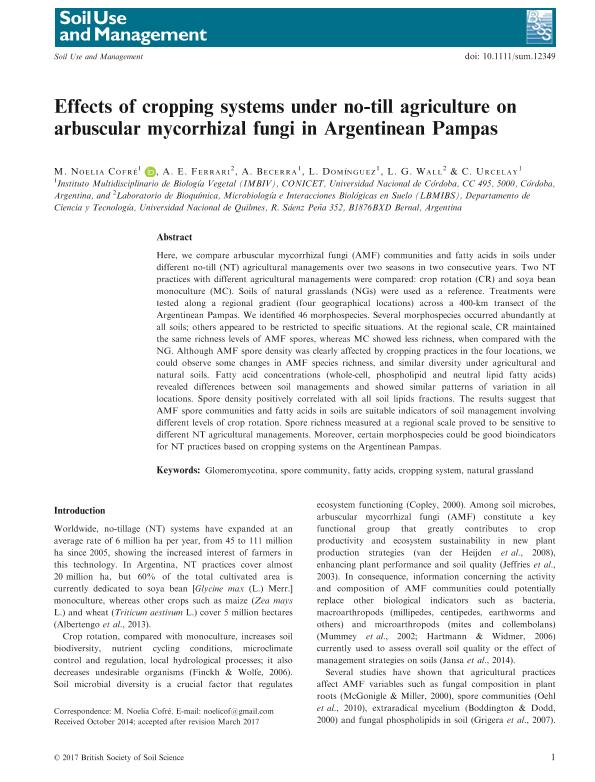Artículo
Effects of cropping systems under no-till agriculture on arbuscular mycorrhizal fungi in Argentinean Pampas
Cofré, María Noelia ; Ferrari, A. E.; Becerra, Alejandra Gabriela
; Ferrari, A. E.; Becerra, Alejandra Gabriela ; Dominguez, L.; Wall, Luis Gabriel
; Dominguez, L.; Wall, Luis Gabriel ; Urcelay, Roberto Carlos
; Urcelay, Roberto Carlos
 ; Ferrari, A. E.; Becerra, Alejandra Gabriela
; Ferrari, A. E.; Becerra, Alejandra Gabriela ; Dominguez, L.; Wall, Luis Gabriel
; Dominguez, L.; Wall, Luis Gabriel ; Urcelay, Roberto Carlos
; Urcelay, Roberto Carlos
Fecha de publicación:
02/05/2017
Editorial:
Wiley
Revista:
Soil Use And Management
ISSN:
0266-0032
e-ISSN:
1475-2743
Idioma:
Inglés
Tipo de recurso:
Artículo publicado
Clasificación temática:
Resumen
Here, we compare arbuscular mycorrhizal fungi (AMF) communities and fatty acids in soils underdifferent no-till (NT) agricultural managements over two seasons in two consecutive years. Two NTpractices with different agricultural managements were compared: crop rotation (CR) and soya beanmonoculture (MC). Soils of natural grasslands (NG) were used as a reference. Treatments were testedalong a regional gradient (four geographical locations) across a 400-km transect of the ArgentineanPampas. We identified 46 morphospecies. Several morphospecies occurred abundantly at all soils;others appeared to be restricted to specific situations. At the regional scale, CR maintained the samerichness levels of AMF spores, whereas MC showed less richness, when compared with the NG.Although AMF spore density was clearly affected by cropping practices in the four locations, wecould observe some changes in AMF species richness, and similar diversity under agricultural andnatural soils. Fatty acid concentrations (whole-cell, phospholipid and neutral lipid fatty acids)revealed differences between soil managements and showed similar patterns of variation in alllocations. Spore density positively correlated with all soil lipids fractions. The results suggest thatAMF spore communities and fatty acids in soils are suitable indicators of soil management involvingdifferent levels of crop rotation. Spore richness measured at a regional scale proved to be sensitive todifferent NT agricultural management. Moreover, certain morphospecies could be good bioindicatorsfor NT practices based on cropping systems on the Argentinean Pampas.
Archivos asociados
Licencia
Identificadores
Colecciones
Articulos(IMBIV)
Articulos de INST.MULTIDISCIPL.DE BIOLOGIA VEGETAL (P)
Articulos de INST.MULTIDISCIPL.DE BIOLOGIA VEGETAL (P)
Citación
Cofré, María Noelia; Ferrari, A. E.; Becerra, Alejandra Gabriela; Dominguez, L.; Wall, Luis Gabriel; et al.; Effects of cropping systems under no-till agriculture on arbuscular mycorrhizal fungi in Argentinean Pampas; Wiley; Soil Use And Management; 33; 2; 2-5-2017; 364-378
Compartir
Altmétricas



